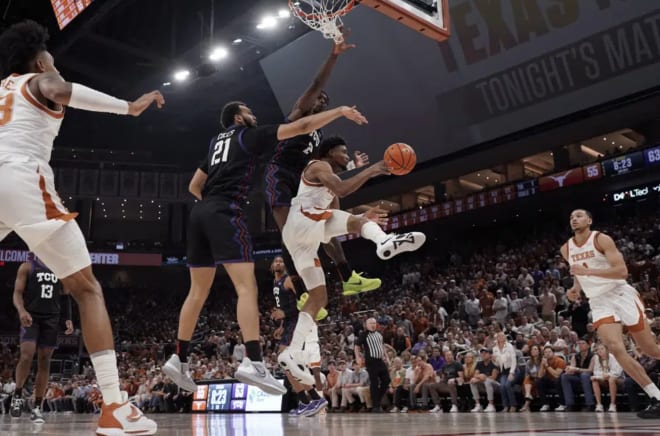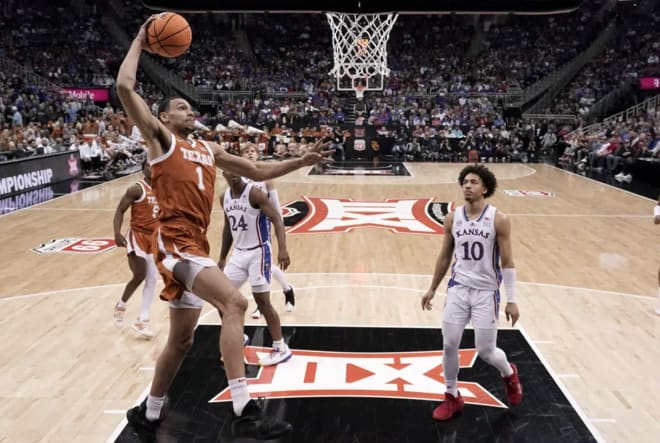Texas battles Miami for a trip to Houston for the Final Four
4:05 CST Tip, CBS.
Sponsorship.
Seth Fowler graduated from Texas in 1998. Since 2004, he has been helping home buyers and sellers in the DFW Metroplex. Whether new construction, existing homes, investment property, or land, he is your Real Estate Sherpa - guiding you through the process, making it an enjoyable experience. Based in Tarrant County, however, he will help connect you with a quality Realtor anywhere in Texas, the United States, or in the world. When looking to purchase or sell real estate in this new market, call Seth at 817.980.6636.

*****
Primer.
After wearing out and beating up on Xavier, 83-71, the Texas Longhorns have just one more opponent standing in between them and the Final Four.
Should they take down Miami,, this Texas basketball team will probably go down as the best team in the program's history, regardless of the results of the Final Four game – but don't tell that to the them. They're not interested in simply making it to the national semifinals: they are there to win the whole thing.
Playing a 30-win ACC team, Texas has one of its toughest challenges of the year ahead of them today, as Miami has been super hot from outside lately. They destroyed the vaunted Houston Cougars defense, dropping 89 points on a group that has been widely considered one of the toughest teams to score against in college basketball this season.
Texas has an excellent defense, but Miami is probably the best offensive team not named Creighton left in the tournament. Can the Longhorns hold it down and prevent easy buckets for the 'Canes? Or will their shooting streak continue?
Read on to find out more about the matchup.

Miami Offense.
The Hurricanes are elite offensively; overall, they rank in the 97th percentile in points per possession at a blistering 1.007 with an effective FG percentage of 54.5%. Not only that, but the Hurricanes are one of the best teams in the country in the fast break, where they rank in the 99th percentile in points per possession in transition at 1.234.
18.1% of their possessions are in transition, so they really like to get up and down the floor as much as possible, spreading you out with multiple elite three-point shooters and one of the best back courts in the country. Isaiah Wong (16.3 Pts, 4.5 Reb, 3.3 Ast), Jordan Miller (15.1 Pts, 6.2 Reb, 2.7 Ast) and Nijel Pack (13.8 Pts, 2.8 Reb, 2.4 Ast) hold it down as three of the top four scorers on the team.
They also have an excellent post presence in Arkansas State transfer Norchad Omier (13.3 Pts, 10.1 Reb, 1.3 Ast), who is the only big that gets consistent minutes. Like Texas when they are without Dylan Disu, the Hurricanes are thin in the front court. Of their top seven leading scorers, just one plays the forward spot; the other six are all guards.
In fact, as far as minutes go, Omier is the only player 6'7 or taller that averages more than 11 minutes per game (Anthony Walker is next on the list at 10.5). Given, Omier is a fantastic player and will be a problem inside for the Longhorns, but they won't have to worry about getting beaten down low with a rotation of big guys that can rebound and score on put-backs.
The Texas defense has been fantastic this year as well. On 7.9% of possessions, they force the other team into an attempt with less than four seconds left in the shot clock, and of those possessions, the opponent averages just 0.564 points per. This is good for the 96th percentile.
Their transition defense is elite as well, where they rank in the 89th percentile, giving up just 0.700 points per possession. This bodes well for a Miami team that ranks 86th percentile in time spent in transition at 18.4%. They like to push the pace, but as Texas defends so well in the fast-break, it would make sense for Miami to try to slow it down a bit more than they're used to.
Miami Defense.
The 'Canes defense is nothing special statistically, giving up just shy of 72 points per game, ranking them 233rd in the country. Like Xavier and Penn State, Miami relies on their offense much more than they rely on shutting down the opponent.
Their overall half-court defense ranks in the 17th percentile in points per possession at 0.923. For reference, the Texas defense ranks in the 77th percentile in points allowed per possession at 0.843 in the half court, and ranks in the 99th percentile in defensive points allowed in transition: 0.815.
Miami has to outscore Texas, because if they get into a grind-it-out defensive battle, it absolutely plays in Texas' favor. The Longhorns rank highly in points per shot as well, especially off the dribble: they rank 79th percentile in this category, averaging 0.75 per attempt.
Much of this is due to Marcus Carr's ability off the bounce, where he is in the 87th percentile in points per shot and 73rd percentile in percentage of shots taken off the dribble (46.1% of his attempts). Miami is average in defending these kind of shots, ranked dead-middle at 50th percentile, 0.800 points per shot.
A real weakness of this defense is that they give up a whopping 1.05 points per shot on contested shots in catch-and-shoot situations, meaning they're mostly playing drop and trying to go behind screens instead of fighting over them and make these shots more difficult. This ranks them in the 10th percentile nationally – not great, Bob.
They give shooters too much room, and it costs them often. Overall, they're in the 34th percentile in opponents points per shot: 1.02 points per. This is not ideal for a defense, especially against a team that can get hot from deep like the Longhorns can.

Gameplan.
Whether or not Dylan Disu plays makes a major difference in this matchup, because defensively, the Hurricanes have no answer for a skilled and extremely efficient 6'9 guy who can step out and hit midrange jumpers. This allows the Texas offense to draw Omier away from the post and allow for guys like Tyrese Hunter to have a lot more room within which to operate.
Disu significantly helps spacing, but Texas has been able to win without their star power forward, including last game's destruction of Xavier, where they essentially beat the brakes off of the Musketeers for 40 minutes. It's going to be important to step on the Hurricanes early and try to really discourage them offensively, contesting shots and not allowing Omier to get good positioning inside. At 6'7, Omier is the same size as Texas backup big Christian Bishop, who will likely start today if Disu is unable to play.
As they generally play disadvantaged in the size category, it will be nice to face a team that lacks a guy even like Jack Nunge, who, though Texas shut him down, could potentially cause problems for an undersized team. Really, the two teams are pretty similar in a lot of ways in that they don't have a ton of front-court depth.
This becomes obvious when you look at the Hurricanes' defensive numbers and how many points they allow per shot on things like layups (1.13 PPS, 30th percentile) and hook shots (1.01 PPS, fifth percentile). They struggle to defend shots inside 17 feet (0.80 PPS, 37th percentile) and midrange shots from 17 feet to just inside the arc (0.79 PPS, 16th percentile). This is stat translates to a big Timmy Allen game, as he feasts in that 15-to-17-foot radius outside the basket.
Meanwhile, Texas is ranked in the 88th percentile in shots from 0-17 feet and 85th percentile in 17 feet to inside the three-point line. This will be a key for the Longhorns. If they can shoot effectively from this area, they will be able to score easy baskets throughout. Of course you want shots closer to the rim than 17 feet, but it should be comforting to Texas fans that the Longhorns' strength is Miami's defense weakness.

Prediction.
I wasn't sure how to feel about this game coming in, but the more research I did, the more I became convinced of an imminent Texas victory. This is no guarantee – Miami is a team that can fill it up on the offensive end. That's not the question for the Hurricanes; they know what they're good at.
The questions start on the defensive end with the statistics I mentioned earlier. I think Texas matches up pretty well with Miami for a slew of reasons I just mentioned. I'm far from saying any game this far along in the tournament will be "easy," because it obviously won't.
But the tenacity with which this team plays and the way that they can take advantage of Miami defensive woes makes me think that Texas is going to advance to their first Final Four since 2003.
PROJECTED SCORE:
Texas 75, Miami 71